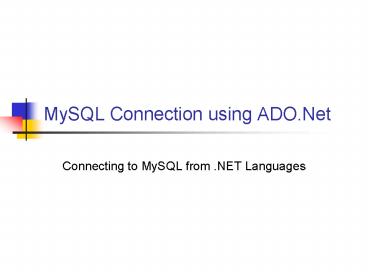MySQL Connection using ADO.Net - PowerPoint PPT Presentation
1 / 10
Title:
MySQL Connection using ADO.Net
Description:
MySQL Connection using ADO.Net Connecting to MySQL from .NET Languages ADO.Net Architecture ADO.Net provides an architecture for communicating between an application ... – PowerPoint PPT presentation
Number of Views:230
Avg rating:3.0/5.0
Title: MySQL Connection using ADO.Net
1
MySQL Connection using ADO.Net
- Connecting to MySQL from .NET Languages
2
ADO.Net Architecture
- ADO.Net provides an architecture for
communicating between an application and a data
source. - The data source can be anything that has the
required API, but usually it is a database server.
Data Source
Connection Object(ADO.Net)
Data Adaptor
Dataset (Local)
Application
3
MySQL ADO.Net Provider
- MySqlConnection is main connection to the MySQL
database - MySqlCommand enables the execution of any command
against the database. - MySqlDataReader provides fast, forward-only read
access to the database. - MySqlDataAdapter serves as an interface between
the MySQL data classes and the Microsoft DataSet.
- MySqlParameter used to store dynamic parameters
for a command. - MySqlTransaction used to represent a MySQL
transaction.
4
Getting MySqlConnector.Net
- You need a MySql "Connector" for .Net
applications. - Download from
- http//dev.mysql.com/downloads/
- Run the installer.
- The connector registers itself with the "Global
Assembly Cache" so that the DLL can be found. - Difference from Java Java uses a CLASSPATH to
find code Visual Studio uses Windows Registry to
find resources. - (Optional for visual programming) Add the
components to the Toolbox in Visual
Studio Tools -gt Add/Remove Toolbox
Items...or Tools -gt Choose Toolbox Items...
5
Undefined MySql Namespace in C
- After installing MySqlConnector.Net, in your
project you would add its name space to your C
source code - using MySql.Data.MySqlClient
- but, you may get a compiler error that the
"MySql" name space is not found. - in this case, add a reference to the Connector's
DLL file - Project -gt Add Reference -gt Browse
- Find the .Net2.0 MySqlData.dll file, ex
- C/MySql/MySqlConnector.Net/bin/.Net
2.0/MySqlData.dll - This should fix the name space problem.
6
Creating a Connection Object
- Connection Object manages the connection to
database server. - You must specify server name, username, password
- Can omit unnecessary attributes or leave blank.
string connectString "Data SourcelocalhostData
basebankUser IdbankPasswordFatChance" MySqlC
onnection myconn new MySqlConnection(
connectString )
Better programming
public DBConnection(string host, string
database, string user, string pass)
string connectString String.Format( "Data
Source0Database1User Id2Password3",
host, database, user, pass) MySqlConnection
myconn new MySqlConnection( connectString )
7
Opening the Connection
- After creating connection, open it.
- This may throw a MySqlException
MySqlConnection myconn null try myconn
new MySqlConnection( connectString
) myconn.Open() catch ( MySqlException e )
Console.WriteLine("Error connecting to
server "e.Message)
8
Creating a Command Object
- Use a MySqlCommand object to issue database cmds
- A Command object is like a Java Statement object.
- You can reuse a Command object.
- Requires a Connection object (myconn) as param.
MySqlCommand cmd new MySqlCommand("SHOW
TABLES", myconn)
- Method of executing command depends on the SQL
statement - UPDATE, INSERT, DELETE cmd.ExecuteNonQuery()
returns int. - SHOW (QUERY) cmd.ExecuteReader() returns
MySqlDataReader
Semi-colon
MySqlDataReader reader cmd.ExecuteReader( )
9
Processing Query Data
- MySqlDataReader has many methods for getting data
by column number, column name, or index. - Iterate over results using (boolean) reader.Read(
)
MySqlDataReader reader null try reader
cmd.ExecuteReader( ) if ( reader null )
Console.WriteLine("ExecuteReader
failed") return while( reader.Read() )
Console.WriteLine( reader.GetString(0) )
catch ( MySqlException e)
Console.WriteLine("caught exception "
e.Message ) finally if (reader ! null)
reader.Close()
10
Resources
- MySQL
- http//dev.mysql.com/tech-resources/articles/dotne
t/ - Learning SQL
- http//www.w3schools.com/sql/ nice tutorial and
command reference - Learning JDBC
- JDBC Trail in Sun's Java Tutorial.
- Dietel, Java How To Program, Chapter 25.
- ... and zillions of resources on the web































